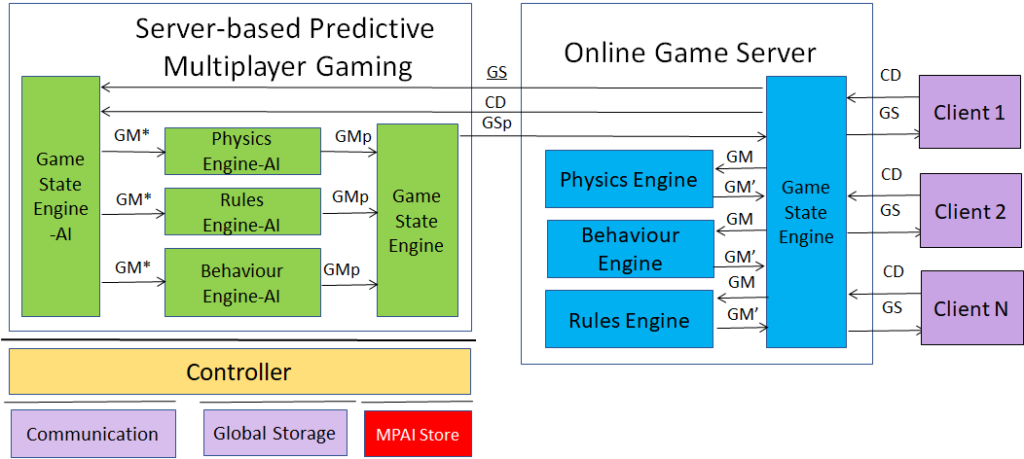This is the public page of Server-based Predictive Multiplayer Gaming (MPAI-SPG) standard. See the MPAI-SPG homepage.
MPAI-SPG aims to minimise the audio-visual and gameplay discontinuities caused by data loss during an online real-time game. In case information from a client is missing, the data collected from the clients involved in a particular game are fed to an AI-based system that predicts the moves of the client whose data are missing. The same technologies may provide a response to the need to detect whether a player is cheating.
The MPAI-SPG Reference Model is given by the figure. The right-hand side is a regular Online Game Server with its clients. The Server is composed of a Game State Engine and specific-functionality Engines (e.g., Physics Engine, Behaviour Engine and Rules Engine). Each Game State with the Control data just received are communicated to the left-hand side which is a digital twin of the Online Game Server composed of trained neural networks (NN) capable of predicting the next Game State even in absence of some control data. 
The MPAI-SPG standard is applicable to both cloud gaming and online gaming. The operation of the MPAI-SPG subsystem includes the following steps:
- The Controller Data and the Game State Engine enter the Game State Engine-AI.
- The Game State Engine-AI produces a set of GM*.
In normal conditions, the set of GM* should be close to the set of GM, because the NN has been trained.
- The Controller Data and GM* feed the Game Engines AI’s.
- The Game State Engine-AI’s produce estimates of the set of Game Messages (GMp).
In normal conditions, the set of GMp should be close to the set of GM’ because the NNs have been trained.
- The green Game State Engine, functionally equivalent to the blue Game State Engine,
- Computes the predicted Game State (GSp).
In normal conditions, GSp should be close to GS.
- Sends the predicted Game State (GSp) to the Game State Engine.
- The Game State Engine
- Corrects its GS if
- GSp is too different than GS (anticheating).
- The Game State Engine was missing some Controller Data.
- Sends its current GS (GS) to the Game State Engine-AI.
- Corrects its GS if
MPAI-SPG is at the level of Use Cases and Functional Requirements. See the MPAI-SPG Progress report and plans
If you wish to participate in this work you have the following options
- Join MPAI
- Participate until the MPAI-SPG Functional Requirements are approved (after that only MPAI members can participate) by sending an email to the MPAI Secretariat.
- Keep an eye on this page.
Return to the MPAI-SPG page

